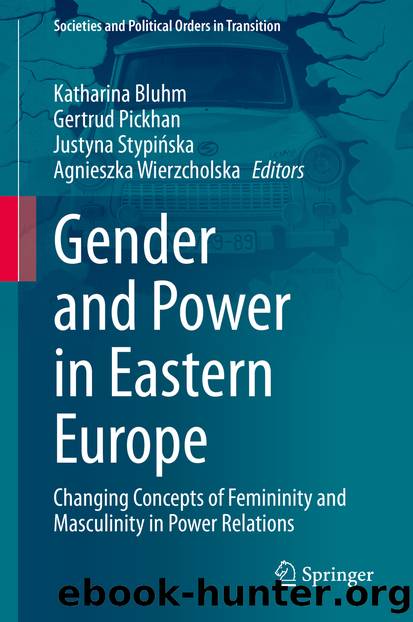Gender and Power in Eastern Europe by Unknown

Author:Unknown
Language: eng
Format: epub
ISBN: 9783030531300
Publisher: Springer International Publishing
4 Conclusion
The concept of ordinariness is highly ambivalent and can assume different meanings and functions depending on the context and political goals it serves. Therefore, a claim to represent âordinary womenâ must be understood in relation to its sociopolitical context. When deployed as a way to refer to âthe people,â ordinariness can be understood in an inclusive or exclusive wayâthat is, either as a monolith that maintains its alleged purity or (as the results of the survey with OSK coordinators revealed) a multiplicity united in its diversity. Meanwhile, references to ordinariness were met with suspicion among feminist activists from the P8KM because this concept has been previously used to divide women (into those who fulfill norms and those who do not) and to discipline those who struggle against sexual orientation/gender-based inequalities and exploitation. However, the subject of the ordinary women described by OSK coordinators needs to first of all be understood as an expression of popular sovereignty. As our research shows, the importance of the OSK protests lies in the fact that a subject calling itself âordinary womenâ has generated a series of demands that do not correspond to the PiS partyâs program for âordinary women.â They demanded the right to make decisions about their own bodies, as opposed to the government or Catholic Church, and celebrated their diversity. Another dimension of ordinariness we took a look at was the statistical average. While aware of the limitations of such statistic approaches (especially regarding constraints and oppression experienced due to gender and sexual orientation), we decided to test some determinants of ordinariness in populist elitesâthe people distinctions through quantitative research. We compared claims of ordinariness linked to geographical location (centerâperiphery), education (cultural capital), and sociopolitical activity by comparing results from our qualitative survey (ordinariness as the statistical average) with countrywide surveys. We were able to show that the work of local OSK coordinators is mainly based in small and mid-sized cities and that half of PK8M members are of small-town origin, therefore complicating assumptions about feminists being representative of metropolitan elites.
The centralization or elitization of sociopolitical life in Poland might have a significant impact on the agency of differently positioned social groups. However, within the frame of this article, we mainly focused on such dimensions as geographical centerâperiphery positions and education, excluding many other important aspects that impact the ability to participate equally in sociopolitical life (such as sexual violence, binary gender norms, classism, nationalism, ageism, ableism, and racism, among others).
There are differences between the two groups we studiedâfor example, their approach toward abortion legislation but also the identity categories, intersectionalities, and dimensions of inequality both groups address. However, our analysis of the public discourse and activities in 2018 also shows that both groups have more and more in common, especially because the OSK is a rapidly developing movement.
The social significance of difference depends, among other things, on what kinds of relationships are generated between different elements: whether it is a conflict, disregarding differences, or their coexistence. In the available comments
Download
This site does not store any files on its server. We only index and link to content provided by other sites. Please contact the content providers to delete copyright contents if any and email us, we'll remove relevant links or contents immediately.
| Africa | Americas |
| Arctic & Antarctica | Asia |
| Australia & Oceania | Europe |
| Middle East | Russia |
| United States | World |
| Ancient Civilizations | Military |
| Historical Study & Educational Resources |
The Battle of Mogadishu by Matt Eversmann & Dan Schilling(754)
The Confidence Men by Margalit Fox(708)
The Spymaster of Baghdad by Margaret Coker(675)
A History of the Muslim World since 1260: The Making of a Global Community by Vernon O. Egger(671)
Jack the Ripper and the East End by Peter Ackroyd(635)
Empire of Fear: Inside the Islamic State by Andrew Hosken(621)
The Afghanistan File by Prince Turki AlFaisal Al Saud(613)
Islam At The Gates: How Christendom Defeated the Ottoman Turks by Diane Moczar(608)
Akhenaten by Dominic Montserrat(606)
The Crimean War by Winfried Baumgart(602)
The Jerusalem Diamond by Noah Gordon(594)
Beirut 2020 by Charif Majdalani(590)
The History of Jihad by Robert Spencer(587)
A Concise History of Greece (Cambridge Concise Histories) by Richard Clogg(584)
The Privatization of Israeli Security by Shir Hever(561)
Enemy in the East by Rolf-Dieter Müller(559)
Israel: Ancient Kingdom or Late Invention? by Daniel I. Block(557)
The Nine Lives of Pakistan by Declan WALSH(552)
Destroying a Nation: The Civil War in Syria by Nikolaos van Dam(547)
